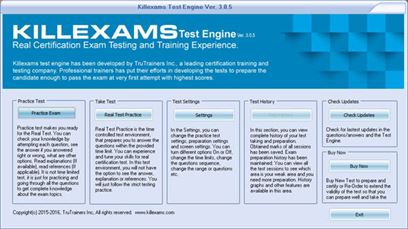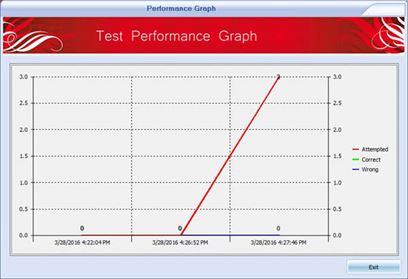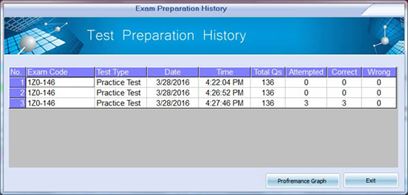E3 Strategic Management Question Tutorial Exam Braindumps
Killexams.com CIMAPRO17-BA2-X1-ENG Exam Braindumps contain complete question pool, updated in April 2024 including VCE exam simulator that will help you get high marks in the exam. All these CIMAPRO17-BA2-X1-ENG exam questions are verified by killexams certified professionals and backed by 100% money back guarantee.
CIMAPRO17-BA2-X1-ENG course outline - E3 Strategic Management Question Tutorial Updated: 2024 | ||||||||
| Killexams CIMAPRO17-BA2-X1-ENG practice exams with Real Questions | ||||||||
 |
||||||||
|
||||||||
|
Exam Code: CIMAPRO17-BA2-X1-ENG E3 Strategic Management Question Tutorial course outline January 2024 by Killexams.com team | ||||||||
| E3 Strategic Management Question Tutorial CIMA Management course outline | ||||||||
Other CIMA examsCIMAPRO15-E03-X1-ENG E3 Strategic Management Question TutorialCIMAPRO17-BA2-X1-ENG E3 Strategic Management Question Tutorial CIMAPRA17-BA1-1-ENG Fundamentals of Business Economics CIMAPRA17-BA2-1-ENG Fundamentals of Management Accounting CIMAPRA17-BA3-1-ENG BA3 - Fundamentals of Financial Accounting CIMAPRA17-BA4-1-ENG Fundamentals of Ethics, Corporate Governance and Business Law CIMAPRA19-E02-1-ENG E2 Managing Performance CIMAPRA19-F01-1-ENG F1 - Financial Reporting CIMAPRA19-F03-1-ENG F3 Financial Strategy CIMAPRA19-P03-1-ENG P3 Risk Management CIMAPRO19-E01-1-ENG E1 Managing Finance in a Digital World | ||||||||
| We are doing great struggle to provide you actual CIMAPRO17-BA2-X1-ENG dumps and practice test. Each CIMAPRO17-BA2-X1-ENG question on killexams.com has been Verified and updated by our team. All the online CIMAPRO17-BA2-X1-ENG dumps are tested, validated and updated according to the CIMAPRO17-BA2-X1-ENG course. | ||||||||
| CIMAPRO17-BA2-X1-ENG Dumps CIMAPRO17-BA2-X1-ENG Braindumps CIMAPRO17-BA2-X1-ENG Real Questions CIMAPRO17-BA2-X1-ENG Practice Test CIMAPRO17-BA2-X1-ENG dumps free CIMA CIMAPRO17-BA2-X1-ENG E3 – Strategic Management Question Tutorial http://killexams.com/pass4sure/exam-detail/CIMAPRO17-BA2-X1-ENG Question: 51 The year-to-date results at the end of month 9 included sales revenue of $3,600,000 and variable costs of $2,100,000. During month 10, sales revenue was $450,000 and variable costs were $270,000. What year-to-date contribution to sales ratio (C/S ratio) would be reported at the end of month 10? A. 58,5% B. 70,9% C. 41,5% D. 40,0% Answer: A Question: 52 Which TWO of the following are characteristics of Management Accounts? (Choose two.) A. Governed by rules and regulations B. Provide information to managers C. Provide information needed by shareholders D. Internally focused E. Statutory requirement Answer: BE Question: 53 In a company that manufactures many different products on the same production line, which TWO of the following would NOT be classified as indirect production costs? (Choose two.) A. Salary paid to the factory manager. B. Factory rent. C. Maintenance costs for the company’s only production line. D. Commissions paid to the sales team. E. Royalties paid to the designers of the products. Answer: AB Question: 54 A small airport’s management accountant has prepared the following management report on the performance of its four retail outlets. Which retail outlet has the highest contribution per square metre? A. Outlet A B. Outlet B C. Outlet C D. Outlet D Answer: C Question: 55 The staffing policy for a supermarket is to have one cashier station open for every forecasted 20 customers per hour. Cashiers are hired by the hour as and when required, and do not perform any other duties. The cost of the cashiers in relation to the number of customers would be classified as which type of cost? A. Stepped fixed cost B. Variable cost C. Semi-variable cost D. Fixed cost Answer: C Reference: https://www.acowtancy.com/textbook/acca-ma/a3-cost-classification/a3g-types-of-cost-behaviour/notes Question: 56 A company uses standard absorption costing. Budgeted and actual data for the latest period are as follows. What was the production overhead absorption rate per unit? A. $21 B. $27 C. $35 D. $29 Answer: C Question: 57 Which of the following would NOT be an appropriate performance measure for a profit centre manager? A. Return on capital employed B. Contribution per unit C. Sales price variance D. Gross margin Answer: B Question: 58 The following data are available for a company that produces and sells a single product. The company’s opening finished goods inventory was 2,500 units. The fixed overhead absorption rate is $8.00 per unit. The profit calculated using marginal costing is $16,000. The profit calculated using absorption costing and valuing its inventory at standard cost is $22,400. The company’s closing finished goods inventory is: A. 3,300 units B. 1,700 units C. 3,900 units D. 8,900 units Answer: A Question: 59 Which of the following would NOT require taking into account the time value of money? A. Deciding to make a long-term investment in a project on the basis of its payback period. B. Selecting an investment project on the basis that it has a positive net present value (NPV). C. Calculating the present value of a five-year annuity. D. Taking a long-term investment decision on the basis of the project’s internal rate of return (IRR). Answer: C Reference: https://www.acowtancy.com/textbook/acca-fm/d1-investment-appraisal-techniques/npv/notes Question: 60 Which of the following is a relevant cost? A. A sunk cost B. A committed cost C. An incremental cost D. A historical cost Answer: C Reference: https://www.acowtancy.com/textbook/cima-p1-2015/c1-relevant-costing/concept-of-relevant-costing/notes For More exams visit https://killexams.com/vendors-exam-list Kill your exam at First Attempt....Guaranteed! | ||||||||
|
All courses offered by the Management & Entrepreneurship Department are listed below. Please note that, not all of the courses listed below are offered every quarter. To find out more information about current and future course offerings, please visit the management course availability page to see which courses are currently being offered. 6: Business Ethics A normative inquiry into the ethical issues that arise in business and how they should be managed. Attention is given to current moral issues in business, to ethical theories and their implications for these issues, and to the managerial implications. Topics may include truth in advertising, corporate social responsibility, affirmative action, government regulation of business, quality of work-life, environmental and resource issues, and ethical codes of conduct. Students who take PHIL 26 may not take this course for credit. (4 units) 6H: Business Ethics Honors section. A normative inquiry into the ethical issues that arise in business and how they should be managed. Attention is given to current moral issues in business, to ethical theories and their implications for these issues, and to the managerial implications. Topics may include truth in advertising, corporate social responsibility, affirmative action, government regulation of business, quality of work-life, environmental and resource issues, and ethical codes of conduct. Students who take PHIL 26 may not take this course for credit. Prerequisite: Enrollment restricted to students in the University Honors or Leavey Scholars programs. (4 units) 40: Foundational Knowledge of Managing for Sustainability This course examines the foundational knowledge required of individuals who seek to effectively manage organizations that meet the triple bottom line: social, economic, and environmental sustainability. Students will learn the concepts critical for understanding sustainability from biological, economic, and social perspectives. Students will learn how to justify the pursuit of sustainable business practices, illustrate the role of businesses in building a just and equitable future, and demonstrate how systems thinking helps to illustrate the interdependent nature of our world. (2 units) 80: Global and Cultural Environment of Business An examination of the basic conceptual vocabulary and theories regarding the economic, political, and social influences on international business today. Topics may include international trade, financial systems, political institutions, cultural factors, corporate structure, and market entry. Students who take this class may not receive credit for MGMT 80L taken in the Santa Clara London Program, or any equivalent course taken in a study abroad program. Prerequisites: BUSN 70 or 170, and ECON 3. (4 units) 162: Strategic Analysis- The Business Capstone Focuses on the processes by which managers position their businesses or assets to maximize long-term profits in the face of uncertainty, rapid change, and competition. Covers various frameworks for analyzing an industry’s structure and a firm’s competitive position, and for developing a coherent, viable, and defensible firm strategy. Requires students to integrate and extend the knowledge and skills that they have developed throughout their coursework (i.e., marketing, finance, economics, organizational behavior, ethics, information systems, statistical analysis, operations management, accounting, etc.) into a “total” business perspective. Prerequisites: ECON 41 and 42 or OMIS 41; FNCE 121 or 121S; MGMT 80, 160, or 160S; MKTG 181 or 181S; and senior standing. (5 units) 162S: Strategic Analysis- The Business Capstone Focuses on the processes by which managers position their businesses or assets to maximize long-term profits in the face of uncertainty, rapid change, and competition. Covers various frameworks for analyzing an industry’s structure and a firm’s competitive position and for developing a coherent, viable, and defensible firm strategy. Requires students to integrate and extend the knowledge and skills that they have developed throughout their coursework (i.e., marketing, finance, economics, organizational behavior, ethics, information systems, statistical analysis, operations management, accounting, etc.) into a “total” business perspective. Enrollment restricted to students in the Leavey Scholars Program. Prerequisites: ECON 41 and 42 or OMIS 41; FNCE 121 or 121S; MGMT 80, 160, or 160S; MKTG 181 or 181S; senior standing; and a minimum 3.5 cumulative GPA. (5 units) 164: Introduction to Entrepreneurship The course looks at the practice of business innovation and entrepreneurship with an emphasis on how entrepreneurs identify opportunities, evaluate resources, build organizations, and understand the phenomena of entrepreneurship. MGMT 164 is an introductory course intended to provide a foundation regarding the role of entrepreneurship, discussing ideas about entrepreneurship, and entrepreneurs in society and the economy. Prerequisites: ACTG 11 and MKTG 181. (5 units) 165: Building a Business MGMT 165 integrates many of the concepts, tools and practices of entrepreneurship. This course is a systematic and practical study of business creation and evaluation for new ventures and entrepreneurial projects. Students will learn to assess and shape venture ideas, convert these ideas into viable businesses, and present these businesses to external stakeholders. Topics include new venture execution plans, alternatives and trade-offs in financing, feasibility, resource acquisition, venture growth and harvesting. The course includes discussion of cases, lectures, and presentations by guest lecturers who have played a role in starting new enterprises. The course builds on foundation concepts from the Introductory Entrepreneurship course. It is designed for students seriously considering launching a new venture in a variety of contexts, and for students planning to work in an early stage venture. Prerequisite: MGMT 164. (5 units) 172: Social Entrepreneurship This course focuses on emerging models of enterprise at the interface of the public, private, and nonprofit sectors. It examines theories of change and the dynamics of social innovation and develops both conceptual and practical tools for creating high performance organizations that are capable of addressing seemingly intractable problems in a financially sustainable manner. Analysis of exemplary social business ventures, including alumni cases from the Global Social Benefit Incubator, will illustrate how the discipline of business planning can contribute the development of social ventures that are economically viable at scale. Students will apply this knowledge to the writing and analysis of a case on an actual social business. Prerequisite: Students must have completed 87.5 units. (5 units) 173: Resources, Food, and the Environment Exploration of relationship among food production, resource use, and the environment. Topics include biotechnology, the green revolution, resource depletion, environmental degradation, and food safety. Also listed as ECON 101. (5 units) 175: Flourishing at Work We spend a large portion of our waking lives at work. It follows that what goes on in the workplace has the potential to significantly impact our ability to flourish – to be in an optimal state of mental and social well-being. Throughout this interactive course, we will explore a variety of Positive Organizational Scholarship Topics from the fields of Organizational Behavior and Psychology that contribute to flourishing individuals, relationships, and systems. The first half of the course focuses on how to promote flourishing at the individual level, including Topics such as mindsets, values, identity, authenticity, and meaning at work. The second half of the course will focus on how to promote flourishing interpersonal relationships and systems, including Topics such as creating high-quality connections, psychological safety in teams, positive interpersonal emotions, networks, culture, and change. Prerequisite: MGMT 160 or 160S. (5 units) 176: Sustainable Food Systems In this course, you will study the existing food system, issues of food access, justice, and sovereignty as well as opportunities to use technology and innovation to create a more just and sustainable food system. We will examine how food policy and lobbying affect food production and consumption and the role of food policy in food insecurity, health risks tied to food, and climate change. The first third of the class focuses on agricultural production, food policy, and issues of access and affordability. The second third analyzes the role of food production in climate change, supply chains, and opportunities for creating more sustainable, traceable, and transparent supply chains. In the final third of the course, we will discuss opportunities for disruptive innovation in the agricultural technology and food technology fields as an agent of change. 178: Business and Human Rights More and more companies are adopting human rights policies, conducting human rights due diligence, reporting on their human rights performance, and employing teams of human rights experts. Through interactive exercises, debates, case studies, and role-play, this course will provide you with the knowledge, skills, and tools to identify and address a company’s human rights risks and leverage the power of business to advance human rights around the world. (5 units) Prerequisite: Students must have completed 60 units. 179: Risk Management A comprehensive examination of corporate risk, including history, current practices, and the impact of risk appetites on culture (and vice versa). Coverage of risk classification, organizational risk structures, and enterprise risk management. Students will engage in the identification, prioritization, mitigation, and reporting of risks, via a hypothetical company with an analysis of actual risks impacting our global corporate landscape. Students will gain familiarity with heat maps and other planning tools, as well as engage in drafting business continuity and disaster recovery plans. Overview of professional risk roles and responsibilities, as well as skills required to obtain these compelling jobs. Focus on understanding risk management roles and honing relevant skills. Prerequisite: MGMT80, MGMT 6 and ECON 3(5 units) 180: Negotiation Skills in Business We negotiate every day, at work, and in our personal lives. The overall goal of this course is to create a learning community where we can all Excellerate our understanding of both the art and the science of negotiation. By learning about the research-based theories of negotiation, students will gain analytic skills in understanding negotiation principles. In preparing for the role plays assigned, students will practice selecting appropriate negotiation strategies for different contexts. By practicing negotiation in a number of different behavioral simulations, and reflecting critically on simulation outcomes, students will gain practical skills in influencing others to secure productive agreements through negotiation. Prerequisite: MGMT 160, may be taken concurrently with instructor permission. (5 units) 181: Conscientious Capitalism The foundation of Conscientious Capitalism is: “To lead others, I will first learn to lead myself.” This course is designed to inspire and teach students about the role of Purpose, Virtue, Intentionality, Tenacity, and Accountability in their leadership journey. The course uses three distinct but related activities to achieve this goal. Nationally renowned business, military, and civic leaders share the experiences and challenges that shaped them, their careers, and major decisions. The goal of having iconic leaders share with honesty and vulnerability is to inspire students to do the same in this course and their lives. Harvard Business School cases give students the opportunity to learn from the most critical business and policy decisions of our times. Putting students in the role of decision-maker challenges them to understand the complexity of decision making and leadership, and begins to train them for their careers post SCU. Leadership Development Teams (LDTs) are small mentored groups. The goal is for students to explore and share their authentic selves and develop the courage to live as their authentic selves in their careers and lives. Note: Evidence of a student’s ambition to make an impact in his or her own life is having the hunger and maturity to pursue the journey of self-awareness, authenticity, and courageous action. (5 units) 198: Internship/Practicum Opportunity for selected upper-division students to work in local organizations. Prerequisites: MGMT 160 or 160S, and two courses from the following list: MGMT 166, 169, 170, 171, 172, 173, 174, 175, 177. Students must have completed 60 units and have the approval of the undergraduate committee one week prior to registration. (1–5 units) 198E: Entrepreneurship Internship This course brings together your academic studies with real-world start-up experience. As such, the class is comprised of two parts: an on-site internship, and an academic segment. The internship must be at least 10 hours per week, 80 for the quarter, starting by the first week of class. During the internship, you will help a Silicon Valley entrepreneurship develop and build a new venture. Here, you will observe a new venture during its formative years. The academic component entails the application of your business studies to a genuine new firm setting. You will examine and analyze your internship experiences with your academic learning. The ultimate product of this class is an in-depth case study of the firm and its founders. Prerequisites: MGMT 164 and must have a declared entrepreneurship minor. MGMT 165 may be taken concurrently. (5 units) Career FocusThis course is appropriate for students interested in pursuing careers in any management function (e.g., operations, marketing, finance) in firms that make, sell and/or distribute physical products, or in organizations (e.g., consulting firms, investment banks, private equity firms, software providers, transportation providers) that analyze, invest in, and/or offer products and services to those firms. Educational ObjectivesSupply Chain Management (SCM) builds on aspects of the first-year Technology and Operations Management (RC TOM) course. However, whereas RC TOM focuses primarily on producing and developing products and services, SCM emphasizes managing product availability, especially in a context of rapid product proliferation, short product life cycles, and global networks of suppliers and customers. Hence, Topics not examined in RC TOM such as inventory management, distribution economics, and demand forecasting are explored in depth in SCM. SCM also differs from RC TOM in that RC TOM concentrates primarily on material and information flows within an organization, whereas SCM focuses on managing material and information flows across functional and organizational boundaries. Due to the boundary-spanning nature of supply chain management, the SCM course also has strong links to the first-year courses in marketing, leadership, and strategy. The course emphasizes the "general manager's perspective" in managing supply chains. Cases in the course illustrate that barriers to integrating supply chains often relate to organizational issues (e.g., misaligned incentives or change management challenges) and operational execution problems (e.g., misplaced SKUs in a retail store) that fall squarely in the domain of the general manager. The course makes clear that suitable information technology and appropriate use of analytical tools are necessary, but by no means sufficient, for supply chain integration. GradingGrading will be based on class participation, engagement, and a capstone project consisting of playing a week-long “Supply Chain Game” simulation and writing a corresponding report. Copyright © 2023 President & Fellows of Harvard College. All Rights Reserved. The Course Outline List component allows you to display a list of course outlines from the central Course Outlines Repository. The list can be filtered by term, course level, section and more to only show specific outlines. Note: If a course outline is not available at www.sfu.ca/outlines, it will not appear in the Course Outline List component. When should it be used?Use this component when you need to display multiple related course outlines on a single page. Be aware that the course outline list can get very long, depending on the filters. Terminology:Current - Two options, Year and Term, can be set to current, which refers to the current registration term. The current registration term will automatically rollover to the next term approximately 10 weeks prior to its start. In-Component Editing OptionsCourse Outline List Tab
Title Header - Insert a title above the course outline list. (If you wish to insert a title with a different size or style of heading, use a Text component.) Year - Filters outlines by year. If left blank, it will use the current year. Term - Filters outlines by term. If left blank, it will use the current registration term. Dept - Filter outlines by department. This is option is required. OptionsClick the Options toggle to reveal additional display options: Split list - Adds a header above each course. See example 2 for a preview. Show all sections - This option displays the outlines for all the sections, including tutorials and labs (e.g, D100, D115, D116, D118). Leaving this unchecked will display one outline for each parent section (e.g., D100, D200), regardless of how many child sections a parent may contain. This helps to reduce duplicate outlines. CSS Class - Allows an author to provide an optional class name that will apply a style to the contents. Filters Tab
Course Levels - Filter outlines by course level. Check each level you wish to display. If no levels are checked, the component will list all levels. Sections - Filter outlines by sections. By default, the component will list all sections. Columns Tab
Columns - Allows you to choose which columns to display. Please enable the “Note” column, if the “Short Note” field was filled in within the Course Outlines Application. Examples of the Course Outline Component
Example #1
This example was set up to show outlines for all 100-level Chemistry courses scheduled for Spring 2014.  For a limited time, when you purchase any course from Goodwin College’s Online Professional Development Course catalog, you’ll receive the online, self-paced course, Speak With Confidence for free! The link to access Speak with Confidence will be included in your course confirmation email that you receive 24-48 hours after registration. Gain a fundamental understanding of the most critical areas in small business management. Whether you already run your own business or are looking to start one, these online small business management courses and certificate can help you take your idea to the next level. Owning or managing a small business has a lot of benefits. Small business owners may have the freedom to control their schedules, be able to focus on work that they find fulfilling and find opportunities to positively impact their communities. However, small business management brings with it some unique challenges. Owners of small businesses often play many roles and must have a wide body of knowledge. In a single day, a small business owner may be required to do any number of varied tasks, like approve a project plan budget, train a new employee and develop a marketing campaign. The following online small business management training courses can be taken individually or in the bundle certificate package at a discounted rate: Certificate in Small Business Management Explore the wide variety of technical and essential skills needed to run a successful small business. Length: 30 hours Format: Online Cost: $499 Accounting Fundamentals for Small Businesses Learn fundamental accounting concepts and develop your ability to record and analyze business transactions, and prepare the four major financial statements. Length: 5 hours Format: Online Cost: $99 Budgeting and Financial Analysis for Small Businesses Develop your ability to prepare budgets, generate pro forma financial statements, and analyze budget variances. Length: 5 hours Format: Online Cost: $99.00 HR Fundamentals for Small Businesses Understand key areas in human resource management, like crafting job descriptions, finding the right people for those jobs, fairly compensating employees, and responding to performance issues. You will also explore employment laws and some best practices for creating a workplace that is safe and healthy for employee Length: 3 hours Format: Online Cost: $79 Introduction to Small Business Management Get a full overview of small business operations, including business planning, legal issues, financial management, human resources, managing people, marketing and customer care. Length: 3 hours Format: Online Cost: $79 Cover the basics of business law as it pertains to small businesses, franchises, and entrepreneurial endeavors, including legal structures for new ventures, contracts, intellectual property rights, real property, employee rights, tax responsibilities, and product warranties and liabilities. Length: 5 hours Format: Online Cost: $99 Leading and Managing Small Businesses Prepare to lead and manage employees in your organization, whether you are navigating through periods of change, growth, or stress. Length: 3 hours Format: Online Cost: $79 Project Management for Small Businesses Master fundamental project management concepts, review common project pitfalls, and understand the importance of each of the five stages of the project life cycle: initiating, planning, executing, monitoring/controlling, and closing. Length: 3 hours Format: Online Cost: $79 Learn how to utilize social media marketing, content marketing and search engine metrics strategically to reach the right audience for your business, service or product. Length: 3 hours Format: Online Cost: $79 Training Course FormatsClassroom TrainingOur most robust form of training—many courses include hands-on labs. Virtual Classroom Training (V) Instructor-Guided Online Training (E) Self-Paced Modular Training (M) Managers desire to lead and administer organizations, departments, or teams toward meeting specific objectives. Their primary interest regardless of industry or departmental level is to live the leadership role employing the resources of people, information, and technology. Does this sound like you? If so, the management major might be for you. This major prepares Mike Cottrell College of Business (MCCB) students to understand management through the four functions of planning, organizing, leading, and controlling. You'll graduate with priority access to two of the Southeast’s fastest growing knowledge economies: the GA 400 and I-985 corridors. Mike Cottrell College of Business’ growing reputation and excellence of its management graduates provides superior hiring potential in this lucrative service area. Degree TypeBachelor of Business Administration
Management Majors Choose One of Four ConcentrationsIn addition to your core business and management courses, you'll select one of the following concentrations. Each of these concentrations were developed to meet the needs of regional employers and as a reflection of changes in the general business environment. Business LeadershipEntrepreneurshipGeneral ManagementLogistics & Supply Chain Management
What Your Journey as a Management Major Could Look Like
Why Management at UNG
How to Become a Management Major
Define Your Own College ExperienceCollege life isn't just about academics. It's about the relationships you make, the experiences you have, and the new things you can discover not just about yourself, but about the world around you. UNG provides many opportunities on each campus and beyond to help you explore your interests and find new passions.
Where All Are WelcomeWe're all different, and we encourage & empower you to be you. We provide a safe space to celebrate and to learn from each other.
Stay Active & WellFrom state-of-the art workout facilities, to over 35 different intramural sports, there are lots of ways to stay fit at UNG.
Find Friends for LifeMembers of our fraternities, sororities, and gender-inclusive organizations find friendship in community service & leadership.
Where Can a Major in Management Lead You?A business management degree from the Mike Cottrell College of Business allows business graduates a great deal of flexibility in their career path while also preparing them for many roles in an organization. Where Our Students Have Interned
Where Our Students Found Jobs
Use the career insights tool to explore different opportunities related to this degree program. Learn about average salary and discover the skills you need to get the job you want. Establishing Connection... Career Focus:This half course provides an introduction to product management, focused primarily on improving and scaling existing products at technology companies. It is designed for three types of students:
Educational Objectives:A Product Manager is obsessed with the problem their product tries to solve and works to both define the product’s functional requirements and lead cross-functional teams to develop, launch and Excellerate their product over time. Taught by an experienced former Google product executive, this course aims to provide an introduction to product management and expose students to key product development and growth strategies so they can build, optimize and scale products following graduation. Product examples cover a range of technology products but most are focused on consumer facing software products in the internet, mobile and marketplace sectors. In the 2023-2024 academic year, cases and assignments will be grounded in products from: Uber, Dropbox, Spotify, Ancestry, Amazon, YouTube, Netflix, Google, Slack, Microsoft, Robinhood, and Peloton. No prior knowledge of Product Management, design, engineering, or computer science required. Those interested in career transitions are especially welcome. The final deliverable for the course will be a 4 hour case-based take home exam. Please note, this course is focused on improving and scaling existing products that have already achieved product market fit at technology companies. While the course also addresses how to generate new product ideas and how to find initial product market fit, these Topics are not a primary focus. This course is a natural companion to Launching Technology Ventures and Startup Operations, both of which focus on early stage ventures searching for initial product market fit. It also complements Scaling Technology Ventures, which has a cross-functional perspective and focuses on overall organization design. Lastly, this course has some overlap with Silicon Valley IFC, which also addresses product-led growth. However where the IFC is a project based field course, this course is mostly case based. Course ContentIn this half course, students will take the perspective of a Product Manager at a Technology company tasked with improving and growing a product. Through case studies, individual assignments, assigned readings, and conversations with product leaders, students will examine different management opportunities and challenges related to building and growing Technology products and practice applying key product strategies to real current situations that PMs at leading Technology companies face. We will explore four different modules:
Copyright © 2023 President & Fellows of Harvard College. All Rights Reserved. Looking for the course catalog?Visit the course catalog page. Need online course help?Technical assistance inquires can be made with the Justice Management program. Please contact Heather Lee at (775) 682-7982 or Nikki Garlic. Flexible Online ClassesJustice management courses are delivered online through a university learning management system (LMS). Courses are offered three times a year (January, May and August). Since going online in 2005, justice management graduates spend an average of 1,223 hours in the online course system and compose an average of 158 pages of text. As working professionals, these students enjoy the 24/7 access to online courses, with most students completing coursework on evenings and weekends. Content Experts for InstructorsContent experts in the various justice management course areas were identified by program administrators as well as by outside supporting agencies such as NCJFCJ, NJCSA, NJC. Additionally, instructors were identified by contacts at various national conferences in the juvenile justice field. These context experts were supplied with approved course descriptions and outlines for development of specific justice management courses. Justice management instructor recruitment has continued since the inception of the program, with a total of 21 instructors having taught justice management courses. Online Course Design - Pairing Instructors with TechnologyAs justice management instructors develop course materials, he or she works individually with the justice management LMS manager to transform those materials into a rich and dynamic online course. The justice management LMS manager completes the initial design of each online course, using materials supplied by the instructor. The course design process is an iterative one, with the justice management LMS manager assisting in the development of various media formats (text, audio, video, images, etc.) as well as interactive online teaching tools. The pairing of a content expert (justice management instructor) with an instructional design expert (justice management LMS manager) insures that each justice management course offers innovative course content, consistent instructional design and utilizes the latest online technologies for course delivery. ONLINE NONPROFIT MANAGEMENT CERTIFICATE & COURSES  For a limited time, when you purchase any course from Goodwin College’s Online Professional Development Course catalog, you’ll receive the online, self-paced course, Speak With Confidence for free! The link to access Speak with Confidence will be included in your course confirmation email that you receive 24-48 hours after registration. Continue your education with self-paced online nonprofit courses and a nonprofit management certificate with Drexel. Gain an understanding of the nonprofit sector and the issues that leaders face in this exciting and growing field. You are also exposed to the major areas of responsibility for nonprofit leaders, including strategy, managing employees, fundraising, grant writing, board governance and social media. The following online nonprofit and grant writing courses can be taken individually or in the bundle certificate package at a discounted rate: Certificate in Nonprofit ManagementUnderstand key management challenges and gain skills in fundraising, board and volunteer development, budgeting, memorizing financial statements, leadership, marketing and setting strategic direction.
Budgeting in a Nonprofit OrganizationIn this course, you study different budget systems as well as the functions of budgets and the relationship between strategic budgeting and tactical budgeting.
Capital CampaignsExplore the phases of conducting a capital campaign—evaluation, feasibility study, organization, solicitation, and post-campaign activities—as well as how to avoid common pitfalls in order to lead a successful capital campaign.Â
Fundraising for Nonprofit OrganizationsLearn how nonprofit funds can be raised through a wide array of mediums and gain methods for evaluating annual campaign performance.
How to Read a Nonprofit Financial StatementDevelop your ability to appropriately interpret the major financial accounting statements that are used by non-profit organizations.
Introduction to Grant WritingLearn the six stages of grant writing—from identifying need to post-grant follow-up—and gain grant writing best practices.
Introduction to Nonprofit ManagementGain an understanding of the nonprofit sector and the issues that leaders face in this exciting and growing field. You also learn the central responsibilities for nonprofit leaders, including strategy, managing employees, fundraising, grant writing, board governance, and marketing.
Leadership in a Nonprofit OrganizationIn this course, you consider the foundations of leadership and examine how to be a successful and effective leader.
Leading the Courtney Museum SimulationAssume the role of executive director of the troubled Courtney Museum, and deal with a series of personnel, marketing, financial, and board and community relations issues to explore real-world leadership issues confronted by nonprofit managers.
Nonprofit Board and Volunteer DevelopmentDiscover the fundamentals of board and volunteer development as well as recruiting, effective communication and retention.
Principles of Marketing for Nonprofit OrganizationsExamine how non-profits use marketing to publicize their mission and to gather contributions of time and money.Â
Social Media for NonprofitsExplore the major social media platforms (Facebook, LinkedIn, Twitter, YouTube, Pinterest) as vehicles for nonprofits to reach and engage with members, volunteers and donors.
Strategy for Nonprofit OrganizationsDo a better job implementing the strategy by understanding a nonprofit's strategy and how it helps the organization fulfill its mission.
| ||||||||
CIMAPRO17-BA2-X1-ENG Free PDF | CIMAPRO17-BA2-X1-ENG exam Questions | CIMAPRO17-BA2-X1-ENG thinking | CIMAPRO17-BA2-X1-ENG exam contents | CIMAPRO17-BA2-X1-ENG test | CIMAPRO17-BA2-X1-ENG approach | CIMAPRO17-BA2-X1-ENG exam Questions | CIMAPRO17-BA2-X1-ENG questions | CIMAPRO17-BA2-X1-ENG candidate | CIMAPRO17-BA2-X1-ENG exam syllabus | | ||||||||
Killexams exam Simulator Killexams Questions and Answers Killexams Exams List Search Exams |
















